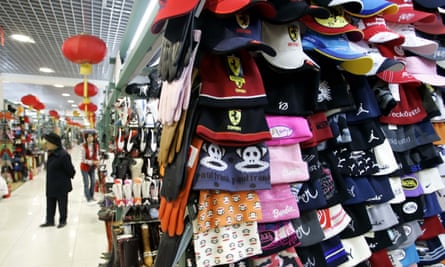Zhang may be smiling but he looks nervous. His stocks have lost 20,000 yuan (more than £2,000) in two days. “I’ll keep my money in, it will go back up again,” he says. “It has to go back up.”
He has invested in a single infrastructure stock, which fell again on Friday as Shanghai’s stock market tumbled by 6% in an hour.

At the end of trading at China Minzu Securities, the brokerage in Jing’an neighbourhood, Shanghai, where Zhang comes to trade, there was a sense of resignation rather than panic. The screens at either end of the room are lit up mostly in green, the colour of losses in China, with only a few lines of red.
“We should have confidence in the stock market,” says Wang, another investor. He is not sure why share prices have been falling but he thinks the government will do something to stop it.
China’s stock exchanges have become a national obsession, with everyone from taxi drivers, college students and pensioners snapping up shares. People joke that no one starts their real job until 3pm when the markets close.
Almost 90 million people hold shares, and up to 1.4 million new investors a week open stock accounts. They have been lured by rocketing prices after the Shanghai stock exchange doubled in a year.
Most of the customers at the brokerage are pensioners who come every day. While some have lost money during recent weeks, many are confident the markets will bounce back. “It is a stock exchange with Chinese characteristics,” says Zhang. Towards the end of trading there were small huddles around the terminals as some investors engaged in last-minute buying and selling.
According to state media, China’s securities market regulator is investigating suspected market manipulation as it attempts to prevent a crash. There have been new rumours on an almost daily basis about what is causing the slump in share prices.
Foreign interference has been a popular theory. A Financial News article suggested foreign investment banks were short selling – causing panic in order to benefit from it.
On Weibo, the microblogging site, this sentiment was echoed by several users. “Now it’s not just about the stock market. It’s a war against those who want to sell short China’s economy,” said one commenter.

On Friday there was speculation that China was behind the stock market volatility. “If I am right, some people/organisations are using everything they can to introduce private money into the market, then the state-owned stocks step out at a high price, then they come back and sell short, now [they are] going to return and buy the stocks back,” said Weibo user Liu Liu.
Despite the losses, there is a typically Chinese dark humour to be found. “Welcome to the China stock market happy valley, now you are going to experience the crazy rollercoaster. It’s really exciting, so if you have a poor heart, please write your last will,” Zhou Mu You wrote on Weibo.
